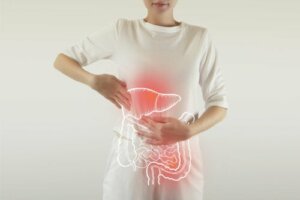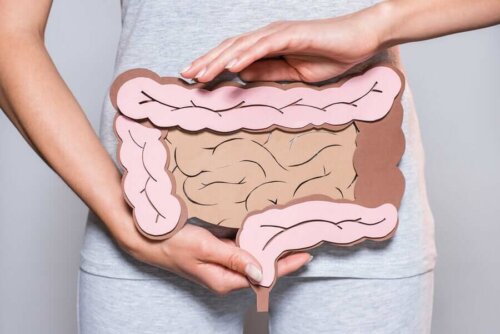Digestive Enzymes: What Do They Do?


Written and verified by the nutritionist Florencia Villafañe
Digestive enzymes are molecules that break down food into simpler portions so that your body can absorb the nutrients it needs. They accelerate chemical reactions by fulfilling specific functions. Without them, your body can’t carry out the digestive process.
It’s important to know that enzymes are in different parts of the digestive tract, from saliva, stomach, pancreatic juice, to intestinal secretions. Also, their location relates to the function they perform and the conditions they need to activate.
Let’s take a close look.
What are digestive enzymes?
Enzymes are molecules, commonly protein, that the body produces. They perform their function through many chemical reactions in the body, but each one is specific and has unique substrates on which it acts.
This means that although there are several types of enzymes, lacking one can lead to certain problems. This is the case with lactase deficiency, the enzyme that breaks down milk sugar, which causes lactose intolerance.

Read also: What Are the Main Food Intolerances?
Types of digestive enzymes
As we mentioned, there are different types of digestive enzymes and each of them acts on a particular nutrient or substrate. Among them are:
- Salivary and pancreatic amylase convert starch to glucose.
- Gastric and pancreatic lipase break down lipids into fatty acids and glycerol.
- Cholesterolase and phospholipase break down cholesterol and phospholipids.
- Proteases are secreted to the intestinal lumen in their inactive form and are responsible for breaking down proteins.
What are enzymes for?
As we mentioned, without digestive enzymes, your body can’t break down the nutrients contained in food. Therefore, your body wouldn’t absorb them. Their action is quite complex, so we’ll explain how they work below.
1. Breakdown of carbohydrates
The digestion of this nutrient begins in the mouth, where salivary amylase begins to exert its effect. Many times, its effect is limited because it depends on the chewing time.
A study published in the International journal Molecular Sciences suggests that if a person chews white bread enough, they may feel a slightly sweet taste due to the breakdown of starch.
Pancreatic amylase continues the process of breaking down carbohydrates. The juice produced by the pancreas is released when the stomach empties its contents into the small intestine. This enzyme is found in the pancreatic juice, and there are also lipases and proteases.
Finally, your body can absorb the simplest units of carbohydrates, glucose, fructose, and galactose.

2. Breakdown of protein
Protein digestion begins in the stomach with gastric pepsin, produced by the stomach. Most of the protein digestion occurs in the first and second portions of the small intestine, where pancreatic proteases act.
These proteases reach the intestine in their inactive form. This is because if they were activated sooner, they could digest the pancreas and cause major complications.
3. Fat breakdown
Lipid digestion begins in the stomach with gastric lipase and accounts for 10% of total digestion. Then, the pancreatic lipase continues this action when the fats reach the intestine and the intestine does 90% of the breakdown.
For the enzymes that break down fats and cholesterol to work properly, they need bile. The liver produces this and it’s stored in the gallbladder.
With the arrival of the fats in the intestinal lumen and notified by nervous signals, the gallbladder releases bile so that it can work together with the lipases, phospholipases, and cholesterolase, respectively.
You might be interested in: The Best Diet After a Cholecystectomy or Gallbladder Removal
Factors affecting enzyme production
Several factors can affect the production or functioning of enzymes. Some of the most common situations are as follows:
- Poor diet
- Gastrointestinal disorders and malabsorption
- Pancreatic insufficiency
- Cystic fibrosis
- Aging, among others

A final note on digestive enzymes
Digestive enzymes play a very important role in breaking down the nutrients that are contained in food. When the body works properly, enzymes also work optimally to metabolize carbohydrates, fat, and protein.
However, when a metabolic disease or a situation that alters enzyme production occurs, it’s likely that food won’t break down as it should. As a consequence, this will cause malabsorption or malnutrition.
All cited sources were thoroughly reviewed by our team to ensure their quality, reliability, currency, and validity. The bibliography of this article was considered reliable and of academic or scientific accuracy.
- García Luna P, López Gallardo G. Evaluación de la absorción y metabolismo intestinal. Nutr Hosp. 2007;22(2):5-13.
- Woolnough J, Bird A, Monro J ,Brennan C. El efecto de una breve exposición a α-amilasa salival durante la masticación en los subsiguientes perfiles de curva de digestión in vitro de almidón.Int J Mol Sci.2010;11(8): 2780–2790.
- Segura Campos M, Chel Guerrero L, Betancur Ancona D.Efecto de la digestión en la biodisponibilidad de péptidos con actividad biológica. Rev Chil Nutr Vol. 2010; 37(3): 386-391.
This text is provided for informational purposes only and does not replace consultation with a professional. If in doubt, consult your specialist.








